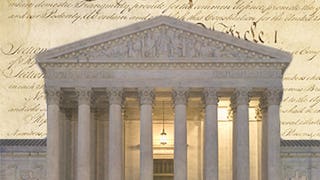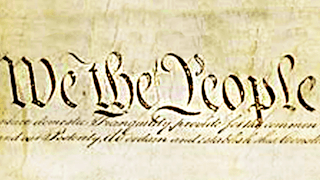Chemerinsky on Constitutional Law: Individual Rights and Liberties will highlight the construction and interpretation of the U.S. Constitution through the centuries with an emphasis on protections of individual liberties and the evolution of equal protection. You'll learn the history behind the Constitution, cases that formed important precedent, and how changes in interpretation have been dependent on shifts in cultural and political climate as well as the composition of the Supreme Court.


Chemerinsky on Constitutional Law – Individual Rights and Liberties

Instructeur : Erwin Chemerinsky
13 091 déjà inscrits
Inclus avec
(84 avis)
Compétences que vous acquerrez
- Catégorie : Court Systems
- Catégorie : Case Law
- Catégorie : Case Studies
- Catégorie : Social Justice
- Catégorie : Social Studies
- Catégorie : Legal Research
- Catégorie : Civil Law
- Catégorie : Law, Regulation, and Compliance
- Catégorie : Policy Analysis
Détails à connaître

Ajouter à votre profil LinkedIn
Découvrez comment les employés des entreprises prestigieuses maîtrisent des compétences recherchées

Il y a 7 modules dans ce cours
Inclus
1 vidéo3 lectures
How are individual rights protected? In this module we’ll take a look at three of the structures that protect our individual liberties: the state action doctrine, the application of the bill of rights to the states, and the levels of scrutiny principle.
Inclus
3 vidéos1 lecture1 devoir
What rights are enumerated in the Constitution? How has the court's understanding and protection of these rights evolved? In this lecture we'll become familiar with the rights that are both specifically enumerated and implied by the text of the Constitution.
Inclus
8 vidéos1 lecture1 devoir1 évaluation par les pairs
In this module we’ll examine how equal protection has been applied to different suspect classifications such as race, gender, citizenship, and more. In addition, we will consider how the court has used levels of scrutiny in order to determine when the government can permissibly discriminate based upon suspect classifications.
Inclus
7 vidéos1 lecture1 devoir1 évaluation par les pairs
Why is freedom of speech protected as a fundamental right? What is its importance? In this module we’ll review four possible answers to this question. We’ll also examine the basic principles that guide the Supreme Court’s methodology when examining questions of free speech. Finally, we’ll take a look at the types of speech that have not been traditionally protected and the limitations that can be imposed on where protected forms of speech can be exercised.
Inclus
4 vidéos1 lecture1 devoir1 évaluation par les pairs
In our final lecture module, we’ll briefly examine the Lemon Test, named after the Lemon v. Kurtzman case in which it was first articulated, to see how the court has evaluated cases regarding the Establishment Clause. We’ll also take a look at how the court decides questions regarding the Free Exercise Clause.
Inclus
1 vidéo1 lecture1 devoir1 évaluation par les pairs
As the course draws to a final close, we would like to thank you for your participation.
Inclus
2 lectures
Instructeur

Offert par
En savoir plus sur Law
 Statut : Prévisualisation
Statut : PrévisualisationUniversity of California, Irvine
 Statut : Prévisualisation
Statut : PrévisualisationUniversity of Pennsylvania
 Statut : Prévisualisation
Statut : PrévisualisationYale University
 Statut : Prévisualisation
Statut : PrévisualisationYale University
Pour quelles raisons les étudiants sur Coursera nous choisissent-ils pour leur carrière ?




Avis des étudiants
84 avis
- 5 stars
91,66 %
- 4 stars
5,95 %
- 3 stars
1,19 %
- 2 stars
0 %
- 1 star
1,19 %
Affichage de 3 sur 84
Révisé le 1 déc. 2020
Erwin is an experienced professor who has a way with the law. He explains in a way that would be easy for a lay person to understand. I hope to learn with him again in the future.
Révisé le 14 juil. 2017
Fantastic course. Interesting subject and great lecturer. I learned a lot and would take any course from Dr. Chemerinsky.
Révisé le 19 oct. 2017
Thanks to the excellent presentation of the course material I have acquired an idea of my own regarding the subject of Constitution and its purpose. Constitution is a remedy for moral turpitude.

Ouvrez de nouvelles portes avec Coursera Plus
Accès illimité à 10,000+ cours de niveau international, projets pratiques et programmes de certification prêts à l'emploi - tous inclus dans votre abonnement.
Faites progresser votre carrière avec un diplôme en ligne
Obtenez un diplôme auprès d’universités de renommée mondiale - 100 % en ligne
Rejoignez plus de 3 400 entreprises mondiales qui ont choisi Coursera pour les affaires
Améliorez les compétences de vos employés pour exceller dans l’économie numérique
Foire Aux Questions
To access the course materials, assignments and to earn a Certificate, you will need to purchase the Certificate experience when you enroll in a course. You can try a Free Trial instead, or apply for Financial Aid. The course may offer 'Full Course, No Certificate' instead. This option lets you see all course materials, submit required assessments, and get a final grade. This also means that you will not be able to purchase a Certificate experience.
When you purchase a Certificate you get access to all course materials, including graded assignments. Upon completing the course, your electronic Certificate will be added to your Accomplishments page - from there, you can print your Certificate or add it to your LinkedIn profile.
Yes. In select learning programs, you can apply for financial aid or a scholarship if you can’t afford the enrollment fee. If fin aid or scholarship is available for your learning program selection, you’ll find a link to apply on the description page.
Plus de questions
Aide financière disponible,
¹ Certains travaux de ce cours sont notés par l'IA. Pour ces travaux, vos Données internes seront utilisées conformément à Notification de confidentialité de Coursera.

